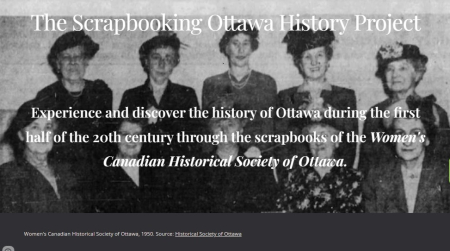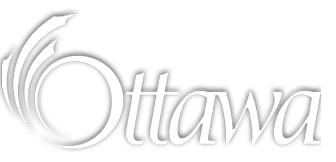On the morning of December 2nd, 2024, eight members of the Historical Society of Ottawa attended the final presentation of the HIS4135 Canadian Digital History Course at the University of Ottawa, The class had taken on the project of digitizing several of the scrapbooks created by our founders, the Women’s Canadian Historical Society of Ottawa, (WCHSO), during the first half of the 20th Century. The students would then conduct some analysis of the contents of the scrapbooks. Their professor, Sarah Templier, explained that this project had been intended for a few years previous, but the pandemic shutdown access to the City of Ottawa Archives and so to the scrapbooks. She went on to explain that scrapbooks were selected, in part, on their completeness. Scrapbooks that contained a lot of loose articles just stuck between the pages were not used as they would have required a lot more work to assemble them prior to digitization. There were other scrapbooks, created by individuals and donated to the WCHSO, but these were not investigated, the research being restricted to what the WCHSO, as an organization, selected. Five full scrapbooks were however digitized and are now available online for the first time.
The class was divided into teams of three students, each focussed on a different theme, and not all working with the same digitized scrapbooks. The themes investigated were: Arts and Culture, Prominent People, Women in Sport, Women in the Public Sphere and Military History. There were some general observations common to most groups despite their specific research areas. Many commented that it was interesting to see what each scrapbooker felt was worth preserving. Equally interesting was what was “missing” from the scrapbook. They could not determine if those items we would deem today as “missing” were not collected because they were not covered by the local newspapers at that time, were not considered to be of sufficient significance or not of interest to that particular scrapbooker. It was also noted that although the scrapbooks were generally in date order, there were also cases where it seemed that articles had been placed onto pages where they would fit so as not to waste the space. Many of the scrapbookers dated their items, but the exact source was seldom preserved.. There seems to have been little collected on what we would now call marginalized communities or immigrant communities. The identification of women proved a constant frustration as, in that period, married women were identified as “Mrs. Someone”, with the resulting loss of connection to their former families and accomplishments. All groups displayed their project web pages and discussed how they had integrated additional research, such as photos, videos or sound recordings to enhance the experience of the viewer, and how they had incorporated maps, word clouds and juxta positioning of findings to produce the same effect.
The Arts and Culture team noted that, despite the lack of government funding, there was a lot of activity in and interest in the cultural landscape of Ottawa. There was also a more diverse population represented in the scrapbooks, including frequent references to Jewish theatre. A map of cultural venues was displayed. Also of interest were a number of famous individuals in the field, especially Yousuf Karsh, who were featured.
The Prominent People team discovered that while some people who garner significant mention in the scrapbooks are still well known today, such as Thomas D’Arcy McGee, others are virtually unknown to the digital world. They also found that the scrapbooker held the power to preserve an individual through their collection. As such, relatives and friends of the scrapbooker achieved a higher level of prominence than we might now attribute to them.
The Women in Sport team noted that there were certain sports that society deemed appropriate for women and that it was understood that women should participate in these sports in an appropriate manner. Thus while words such as “strong” and “powerful” would be used to describe male athletes, words such as “graceful” and “elegant” would be used to describe female athletes. The team also revealed the disparity of opportunity afforded to men and women interested in sport. The achievements of Barbara Ann Scott were well covered in the scrapbooks.
The Women in the Public Sphere team looked into where women achieved positions of leadership in the community and how this was reflected in the scrapbooks. Much of this happened in volunteer organizations and Women’s Clubs, such as our own WCHSO. Religious organizations, such as the Catholic Women’s League offered other options. The team highlighted the work of women in the Canadian Red Cross, contrasting their limited role during the First World War, doing fundraising and knitting in Canada, to their more evolved role during the Second World War, which saw women serving in large numbers overseas. The team also noted that the rise of women was not always well received.
The Military History team focussed on three time periods. Scrapbook 2 was primarily focussed on the period immediately following the First World War. The WCHSO scrapbookers collected stories related to demobilization and returning soldiers. Special interest in the 38th Battalion was noted. A few years of the interwar period, 1934/35 and 1937 were remarkable for the almost total lack of information related to the Canadian military, apart from the annual Armistice Day commemoration. This accurately reflected the state of military affairs in Canada at the time. Scrapbook 5 covered the period of 1940/41 and was dominated by the military build-up in Canada and a growing spirit of patriotism and support for the Crown.
The culmination of their project work, along with the five scanned scrapbooks, is now available to the public and can be viewed at: Scrapbooking Ottawa History or to enter into your browser: https://sites.google.com/view/scrapbookingottawahistory/home
The Historical Society of Ottawa would like to thank and congratulate the students for the work they have undertaken on our behalf to make this material more accessible to researchers. One student did caution that although the .pdf versions of the scrapbooks are searchable using Optical Character Recognition (OCR) software tools, these tools are not 100% reliable and may miss occurrences of the text string being searched for.
As a gesture of our appreciation, we will be giving Sarah Templier and each of her students: Gina Aiello, Anthony "Tony" Butticci, Daniel Cantin, Asia Csabi, Kristine Feria, Chenxuan Fu, Émilie Hollingsworth, Malcolm La Prairie, Caleb Ka Yu Lee, Noah Louden, Brennan Macey, Anthony Martimbeault, Emma Penwell, Isabelle Schneider and Ethan Stitt, a one year complimentary membership to the Historical Society of Ottawa. We hope to see you all at our events for many years to come.






